|
|
|
Sort Order |
|
|
|
Items / Page
|
|
|
|
|
|
|
| Srl | Item |
| 1 |
ID:
065941


|
|
|
| 2 |
ID:
186435
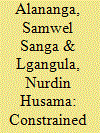

|
|
|
|
|
| Summary/Abstract |
Despite of the promising benefits of modern and clean cooking energies, its adoption has been extraordinarily low in Tanzania principally owing to preferences for Dirty and Clean Energy Mixes (DCEMs) over Clean Energy Mixes (CEMs). This study examines this energy stacking behavior based on a 2018 survey dataset of 245 useable responses from Kigamboni district in Dar es Salaam Tanzania. It is notable that the energy transition is from Single Dirty Energy (SDE) or Dirty Energy Mixes (DEMs) towards CEMs via Single Clean Energy (SCE) i.e. LPG with DCEMs in both its lower and upper sides. This approach tends to lengthen the path of transition because CEMs for cooking purposes is only affordable to the minority very high SES class. As a result the majority poor are pushed into the dirty energy “trap” despite of the booming LPG market. Although LPG support initiatives can eliminate dirty non-commercial energies, such initiatives cannot solely be relied upon to reducing the domestic consumption of dirty commercial energies even at high SES. Policy options are two way; either to alleviate SES to the level that quicken the transition or adopt wider electrification alongside appliance subsidies or microfinance to enhance CEMs affordability.
|
|
|
|
|
|
|
|
|
|
|
|
|
|
|
|
| 3 |
ID:
150911


|
|
|
|
|
| Summary/Abstract |
A majority of grid-connected households in South Africa use electricity for cooking and heating tasks. This thermal intensive use of electricity has a high load factor and is a contributory factor of electricity demand outstripping supply at peak demand periods. The government has promoted liquefied petroleum gas (LPG) as an alternative thermal energy source for household cooking and heating. This study evaluates the long-term successes, challenges and social impacts of an LPG intervention project that was piloted in Atteridgeville Township, a typical low-income suburb. The data was gathered through one-on-one household interviews with a sample of the beneficiaries. The results indicate that seven years after the LPG intervention, about 70% of the beneficiaries continue to use LPG and report that the intervention has improved their welfare. Fast cooking is cited as the key tangible benefit of LPG technology in households, followed by saving on electricity bills. The project would have achieved more success through better community engagement, including strict beneficiary selection criteria; a long-term LPG distribution and maintenance plan; and inclusion of recurring monthly LPG subsidies for indigent households. The study discusses the subset of factors necessary for successful rollouts of similar energy projects.
|
|
|
|
|
|
|
|
|
|
|
|
|
|
|
|
| 4 |
ID:
128000
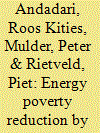

|
|
|
|
|
| Publication |
2014.
|
| Summary/Abstract |
In low- and middle-income countries, Liquefied Petroleum Gas (LPG) can be an attractive alternative to the widespread use of traditional kerosene. Not only is LPG a relatively clean, safe and cost-effective fuel for households, its large-scale adoption also reduces the heavy burden of kerosene consumption subsidies on government budgets. Against this background, we evaluate the impact of a large government program to substitute LPG for kerosene in Indonesia. Using a household survey across urban, suburban and rural regions we find that this program was very effective in causing a large scale shift from kerosene to LPG. This shift was positively influenced by level of education, household size and household income. Contradicting the energy-ladder model, the LPG program, reinforced by an increase in the price of kerosene, led to increased stacking of fuels, including increasing consumption of both electricity and traditional biomass. In addition, our analysis shows that the LPG program failed to substantially reduce the overall number of energy-poor people, but it has been effective in alleviating extreme energy-poverty. Finally, we find that medium and higher income households in suburban areas benefitted most from the LPG program.
|
|
|
|
|
|
|
|
|
|
|
|
|
|
|
|
| 5 |
ID:
181468
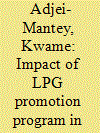

|
|
|
|
|
| Summary/Abstract |
This study investigates the impact of a clean cooking intervention on primary fuel choice and on households’ willingness to pay for an improved LPG distribution model in Ghana. Using data obtained via a survey of 904 households in two beneficiary districts, we found that the intervention led to higher LPG usage. The program increases the probability of households choosing LPG as a primary cooking fuel by 24% and the rate of use of LPG among households by 33%. Furthermore, an analysis of willingness to pay shows that delivery preference is not statistically different between beneficiary and control groups. The distance to refill the cylinder significantly affects LPG usage and willingness to pay. A policy that brings LPG refill closer to households and reduces the time and money cost of accessing a refill station is key to increasing the adoption of LPG as the primary cooking fuel.
|
|
|
|
|
|
|
|
|
|
|
|
|
|
|
|
| 6 |
ID:
136252


|
|
|
|
|
| Summary/Abstract |
Solid cookfuel pollution is the largest energy-related health risk globally and most important cause of ill-health for Indian women and girls. At 700 million cooking with open biomass chulhas, the Indian population exposed has not changed in several decades, in spite of hundreds of programs to make the “available clean”, i.e. to burn biomass cleanly in advanced stoves. While such efforts continue, there is need to open up another front to attack this health hazard. Gas and electric cooking, which are clean at the household, are already the choice for one-third of Indians. Needed is a new agenda to make the “clean available”, i.e., to vigorously extend these clean fuels into populations that are caught in the Chulha Trap. This will require engaging new actors including the power and petroleum ministries as well as the ministry of health, which have not to date been directly engaged in addressing this problem. It will have implications for LPG imports, distribution networks, and electric and gas user technologies, as well as setting new priorities for electrification and biofuels, but at heart needs to be addressed as a health problem, not one of energy access, if it is to be solved effectively.
|
|
|
|
|
|
|
|
|
|
|
|
|
|
|
|
| 7 |
ID:
180094
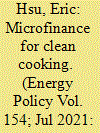

|
|
|
|
|
| Summary/Abstract |
Liquidity constraints are a key barrier to acquisition and sustained use of clean household energy in resource-poor settings. This study evaluates a pilot microfinance initiative in Kenya to help low-income rural households access liquefied petroleum gas (LPG) for cooking. Program beneficiaries received a six-month loan that covered all equipment costs and was to be repaid in monthly installments. We present results from surveys of beneficiaries (n = 69) after they began using LPG, as well as 332 non-beneficiaries from the same community (to understand how beneficiaries and non-beneficiaries differ in cooking patterns and socioeconomic outcomes). 94% of beneficiaries had repaid their loan in full and on time at the time of data collection. Meanwhile, beneficiaries were more likely than non-beneficiaries to use LPG as their primary cooking fuel (76.8% of beneficiaries versus 38.8% of non-beneficiaries). While 81.1% of beneficiaries who used LPG as their primary cooking fuel reported multiple fuel use, we find beneficiaries increased LPG use by 5.9 h per week with a corresponding decrease of 4.8 h in weekly use of biomass fuel. Our findings suggest that promoting LPG usage through microloans for equipment is likely to be both commercially viable and beneficial to health through decreased use of polluting biomass fuel.
|
|
|
|
|
|
|
|
|
|
|
|
|
|
|
|
| 8 |
ID:
132650


|
|
|
|
|
| Publication |
2014.
|
| Summary/Abstract |
The world×s most expensive motor fuel (gasoline, diesel and LPG) is sold most likely in the Republic of Turkey. This paper investigates the key issues related to the motor fuel prices in Turkey. First of all, the paper analyses the main reason behind high prices, namely motor fuel taxes in Turkey. Then, it estimates the elasticity of motor fuel demand in Turkey using an econometric analysis. The findings indicate that motor fuel demand in Turkey is quite inelastic and, therefore, not responsive to price increases caused by an increase in either pre-tax prices or taxes. Therefore, fuel market in Turkey is open to opportunistic behavior by firms (through excessive profits) and the government (through excessive taxes). Besides, the paper focuses on the impact of high motor fuel prices on road transport associated activities, including the pattern of passenger transportation, motorization rate, fuel use, total kilometers traveled and CO2 emissions from road transportation. The impact of motor fuel prices on income distribution in Turkey and Turkish public opinion about high motor fuel prices are also among the subjects investigated in the course of the study.
|
|
|
|
|
|
|
|
|
|
|
|
|
|
|
|
| 9 |
ID:
065939
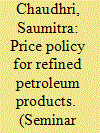

|
|
|
| 10 |
ID:
110698


|
|
|
|
|
| Publication |
2011.
|
| Summary/Abstract |
In 2007 Indonesia undertook a massive energy program to convert its primary cooking fuel from kerosene to LPG in more than 50 million households. This megaproject, to be completed in late 2011, provided an improved household cooking fuel, with its associated benefits in user costs, cleanliness, convenience, and environment, and reduced the government's huge subsidy for petroleum fuels. Presented from the perspective of Pertamina, Indonesia's sole NOC, and the program implementer, this paper describes the background of the fuels situation, the planning stages, including the preparatory analytical work, targeted market surveys and tests, and the subsequent building of the financial, technical, and institutional models for carrying out the program on an expeditious schedule. It presents the project's major execution steps, results of the program to date, and the unique institutional roles of each party, including the activities and benefits for the government, Pertamina, the public, the industry, and the crucial agents in the fuel supply chains. Finally there is a retrospective policy analysis and a discussion of key factors and challenges in the execution of Indonesia's largest-ever energy initiative to provide improved cooking fuel.
|
|
|
|
|
|
|
|
|
|
|
|
|
|
|
|
| 11 |
ID:
112317


|
|
|
|
|
| Publication |
2012.
|
| Summary/Abstract |
The use of LPG as automotive fuel is on the increase worldwide. In developing countries such as Ghana, the rudimental way of operating LPG cars is of a national concern since there is no clear cut framework within which they function. This paper presents a scenario of development from conversion of gasoline to LPG fuelling system in cars in Ho, Ghana. Data were collected through survey (100 questionnaires), in-depth interviews (2), Focus Group Discussions (3) and direct observations. The result shows LPG conversion is carried out by the local informally trained mechanics especially for Taxis because of its low consumption resulting in more profit. Conversion takes 1-2 day with an average estimated cost of GH? 450 cedis ($300). The LPG policy in Ghana focuses on domestic purposes hence the fuel being heavily subsidised. Challenges' being faced by the autogas market in Ghana includes; no clear cut policy, low number of refuelling stations, lack of standard conversion and installation kits and unprofessional LPG installers. In order for government to benefit from LPG as automotive fuel, coherent autogas policy should be formulated ensuring the availability of the LPG with price affordability as in the case of gasoline and diesel.
|
|
|
|
|
|
|
|
|
|
|
|
|
|
|
|
|
|
|
|
|